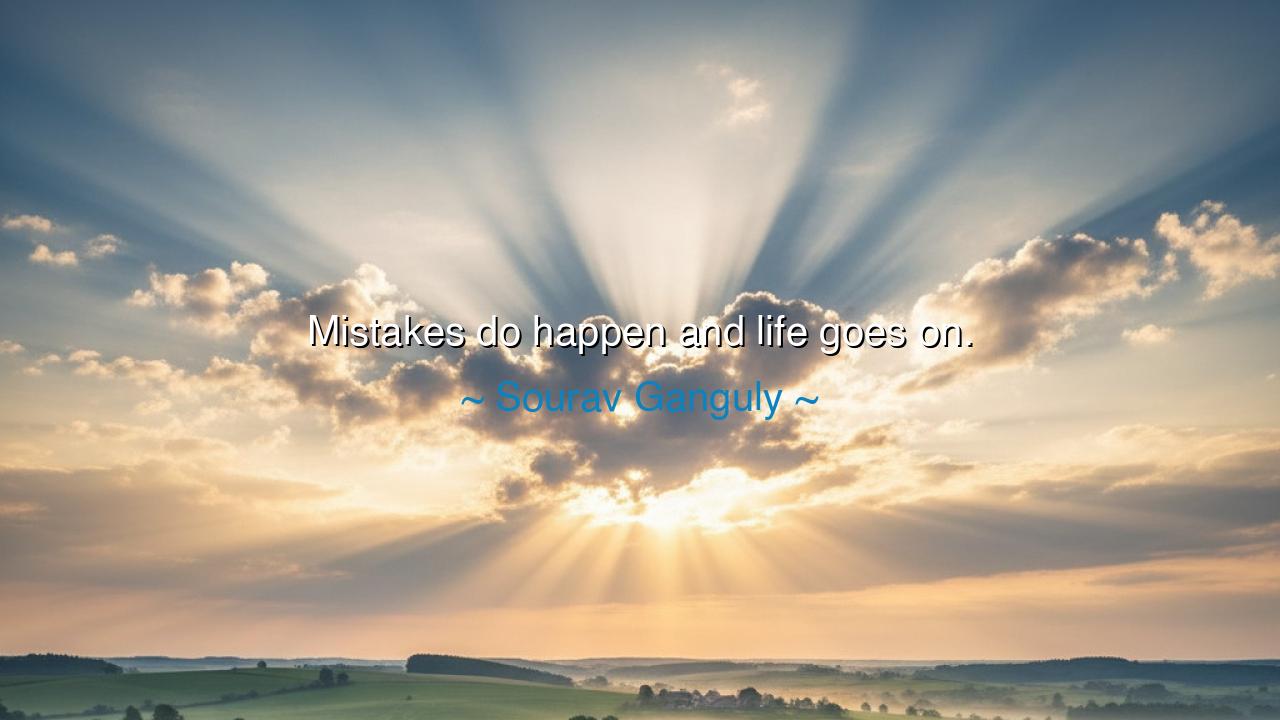
Mistakes do happen and life goes on.






Sourav Ganguly, the warrior of Indian cricket and captain of fierce spirit, once said: “Mistakes do happen and life goes on.” At first, these words seem simple, like the casual shrug of a sportsman. Yet beneath their calmness lies a philosophy as old as the mountains: that failure is not the end of the journey, but a step upon it. To live is to err, and to err is to be human. The wise do not drown in regret, nor do they deny their faults—they acknowledge them, learn from them, and move forward. In this way, life goes on, carrying us from darkness into dawn.
The origin of this quote can be traced to the heat of the cricket field, where triumph and failure walk hand in hand. Ganguly, who led India into a new era of confidence and courage, knew the taste of both glory and defeat. As captain, he made bold choices, some of which were questioned, some of which failed. Yet he did not bow to despair. He understood that mistakes are woven into the fabric of competition, and that greatness lies not in avoiding them, but in rising stronger after them. His words are the reflection of a warrior’s heart, tempered by trial.
The ancients, too, proclaimed this truth. Seneca, the Stoic, wrote that no man becomes wise without many errors, and that even stumbling can teach the feet how to walk. The Eastern sages taught that failure is the first teacher of success. In every culture, the message has been the same: mistakes are not curses, but guides. They cut our pride, humble our spirit, and sharpen our will. Ganguly’s words echo these eternal teachings, reminding us that the stream of life does not stop for our failures—it flows forward, urging us to rise and walk again.
History offers shining examples. Consider Abraham Lincoln, who faced defeat after defeat—failed businesses, lost elections, public ridicule. Yet he did not let mistakes end his journey. Instead, he carried on, learning with each setback. In time, he became the president who preserved the Union and ended slavery. His life proves Ganguly’s wisdom: mistakes do happen, but life goes on—and those who endure find greatness beyond their stumbles.
The lesson for us is clear: do not be crushed by your mistakes. They are not final judgments, but temporary lessons. If you fail in your work, rise and try again. If you stumble in relationships, seek forgiveness and rebuild. If you fall short of your own ideals, use the fall as fuel for growth. Life is not meant to be perfect—it is meant to be lived. And living always includes failing, learning, and pressing onward.
Practical actions follow. First, when you make a mistake, name it honestly, without excuses. Second, seek the lesson within it: what did it reveal about your weakness, your haste, your blind spots? Third, act—do not stay frozen in regret. Correct what you can, and move forward where you cannot. And finally, forgive yourself, for the burden of self-hatred is heavier than the mistake itself. In this way, mistakes become stepping-stones, not stumbling blocks.
Thus, O listeners, let Ganguly’s wisdom sink into your hearts: “Mistakes do happen and life goes on.” This is not a call to carelessness, but to courage. It is not an excuse to remain in error, but an invitation to rise again. Life’s river does not stop for your tears; it flows forward, carrying you to new shores. Let your mistakes teach you, but never chain you. Let them humble you, but never break you.
And remember this: the true defeat is not in the making of a mistake, but in refusing to move beyond it. The true victory is in rising, scarred yet stronger, and walking again into the battle of life. For mistakes are fleeting, but the journey is eternal—and life always goes on.






AAdministratorAdministrator
Welcome, honored guests. Please leave a comment, we will respond soon